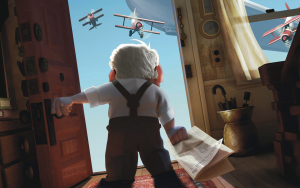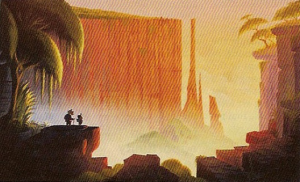Up
Today was the first time I have cried in a cinema for a long, long time. The reason? Pixar’s latest: Up. The studio behind such wonderful films as Monsters, Inc. and Ratatouille could never be accused of crafting a film lacking in heart (even Cars has a beautiful beginning and end) but even with that in mind, Up is a staggeringly emotional piece of work.
 |
I am going to attempt a review with as few spoilers as possible, as I truly hate checking to see if a particular release is worth my money only to be told everything about it during reading, but special mention must go to the opening 20 minutes of Up, for being genuinely beautiful and truly poignant. The film is a nothing short of a meditation on growing old and living life. Of the difference between the Disney-esque notion of following your dreams (in this case a desire to explore the uncharted South American lands of Paradise Falls) and the reality of having them fall by the wayside as you take care of the challenges life throws at you.
Carl Frederickson, (played with tender gruffery by Ed Asner) the endearingly cantankerous septuagenarian you will have seen adorning buses all over the country, starts the film as a wide-eyed youngster, staring with awe at a 1930s cinema newsreel, depicting the adventures of world-renown explorer, Charles Muntz (Christopher Plummer). Charles has just returned from exploring Paradise Falls, and has brought back skeletal evidence to prove it. Scientists of the time suspect fraud, and so Charles is forced to return to the wilderness to clear his name, to Carl’s great outrage. Carl then meets the gamine Ellie, (Elie Docter) who shares his passion for exploration, and his adulation for Charles. Young love blossoms, and as Carl stares out his bedroom window, lovesick from their first meeting, the film kicks into a quite extraordinary gear.
Those of you who have seen Pixar’s previous release, WALL·E, will know just how much can be achieved through animation, sound effects, and music. Director Pete Docter (Monsters, Inc.) applies these lessons to the opening of Up, both with the tellingly laconic Carl and with the montage which follows his starlit gazings. I refuse to divulge information about it, as it simply must be seen to be appreciated, but it is a master class of economy and heart-wrenching beauty, and watches somehow like an excellent comic book. Its five-minute duration is nothing short of heartbreaking, leaving Carl devoid of purpose, and with nothing but his dreams of Paradise Falls to pursue.
The film then segues to present day, with Carl living in the only house on an otherwise abandoned building site, everyone else having sold their land. He just wants to be left alone with a house that represent all his memories of the past, but building contractors and an exuberant Wilderness Explorer (read: cub scout) named Russell (Jordan Nagai) refuse to leave him alone.
From decade-spanning beginnings the film then jumps into the action of the present, as Carl evades being put into a retirement home by attaching hundreds of balloons to his house, having it sail into the sky for Paradise Falls. It is a startlingly simple, story-book image, bringing to mind James And The Giant Peach. It is at this point that Carl realizes the portly Russell has inadvertently tagged along with him, and so Carl reluctantly brings him along on his journey to Paradise Falls.
This opening is both hugely bleak and tremendously exciting, with some excellent stabs of dark humour which recall The Incredibles at its best, including a fantasy of Carl’s where he dreams of disposing of a particularly rotund annoyance. Past this point, the film pulls a WALL·E, and jumps into scenes of rapid dialogue, kinetic action and wacky characters, including some charming talking dogs and a relatively entertaining colourful bird, christened Kevin. What differentiates Up from WALL·E’s enormous disparity of styles between its halves, though, is that Up has a coherence of theme and message which permeates the entire film, and manages to draw together such scenes as an old man’s tedious daily morning routine with a breath-taking chase across collapsing rock formations, without ever seeming forced. It has a purpose, and what is fascinating is how the message of the opening section is gradually expanded upon and developed in a life-affirmingly touching scene which closes the second act.
Everything about this film suggests thoughtfulness and wit. It goes from cracking visual gags to heartfelt introspection without ever dropping the pace, and such is the design of the story and the pacing that it never drags or feels fragmented. As Carl realizes that his life was not the waste he initially perceived it to be, through a visual metaphor of utmost elegance, he regains control of his existence and flies determined towards the final, entertaining and action-filled act.
 |
There is so much of Up I haven’t talked about: the beautiful visuals; the unique setting; the unconventional hero; the lovely voice acting; the perfect nomenclature of Paradise Falls, but to be honest, much of which I could have spoken we have all come to expect from a powerhouse of story-telling like Pixar. They are constantly raising the bar for animated films, both technically and from a narrative perspective, each release further challenging perceptions of what a “family film” can be. What I wanted to focus on was film as a whole; the emotion that comes through when a project like this comes together. The subtlety of facial expression and performance, the perfect elegance of theme and metaphor which combine to make you cry with sorrow and delight, that people as talented as this exist and are making big budget films which are this worth watching.
You may feel I am waxing lyrical, and you may be right. But as films go, even though the middle section is a more simplistic fare, even though the villain is a little one-dimensional, even though the first 3D film from Pixar may as well not have bothered being in 3D for all the difference it makes, Up has it where it counts; everything is about story, and character, and emotion. And the leaps Pixar have made here are in a truly eponymous direction.
![]()

> but it is a master class of economy and heart-wrenching beauty, and watches somehow like an excellent comic book. Its five-minute duration is nothing short of heartbreaking
It is probably the greatest sequence Pixar have ever put together. No dialogue, we never hear older Ellie’s voice. The balloon floating across to her bed is so touching it’s unreal. That is magic onscreen right there.
When you withness an opening sequence like that, something that could maybe have even stood on its own as a 5 minute short, you know you’re in safe hands for the rest of the film, no matter where the (crazy) plot goes. We shouldn’t be surprised though seeing as this IS Pixar! These are the guys who had people crying all of 2 minutes into Finding Nemo, and they were fish for crying out loud!
By performingmonkey
November 20, 2009 @ 3:27 am
reply / #